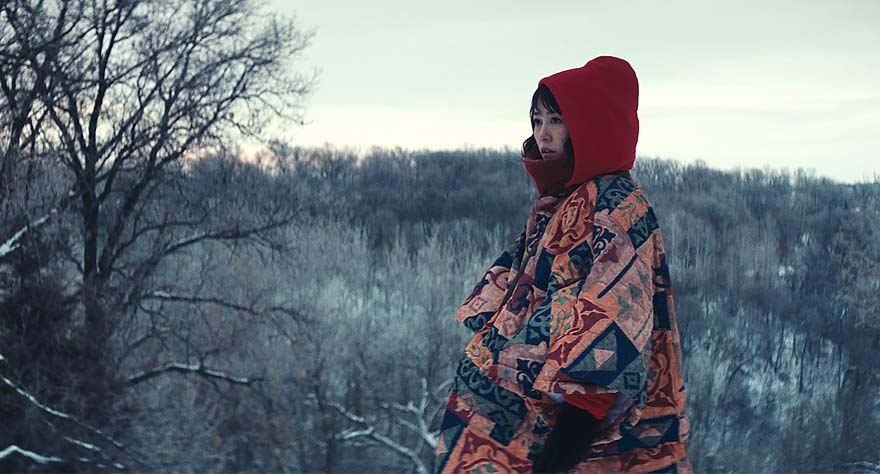
There are more than a few treasures to be found in this misguided adventure.

There are more than a few treasures to be found in this misguided adventure.
There are many parallels between David Zellner’s Kumiko, the Treasure Hunter and the offbeat adventure film its inspired from, the Coen Brothers modern-day classic Fargo. For starters, both of these films were co-written by brothers, who embellish real life events to form their own story. This story is based off an urban legend of a Japanese woman named Takako Konishi who died in Minnesota while searching for the missing money from the movie Fargo. Zellner even borrows the exact opening warning screen used in Fargo, which insists that “the following events are based on a true story.” Only here the warning screen is shown with intentional picture degradation, as if it were played from an old VCR (something that happens later on in the film). By doing so, Kumiko, the Treasure Hunter establishes its sense of playful meta-ness, blurring the line between fact and fiction from the beginning. What follows is a melancholy odyssey told from a skewed perspective about searching for something that doesn’t exist.
Tokyo never felt like home for Kumiko (Rinko Kikuchi), a bored office worker who rarely speaks unless spoken to first. The monotony of her day-to-day routine and nagging phone calls from an overbearing mother are slowly eating away at her soul. Until one day she discovers a hidden VHS cassette tape of the Coen Brothers’ cult classic Fargo. Fans of the 1996 hit film may recall a scene in which a suitcase filled with cash is buried and marked with an ice scraper in the rural Minnesota snow. Convinced this event actually happened, Kumiko feverishly re-watches the film over and over, looking for clues and carefully mapping out the location of the buried treasure. Believing it’s her destiny to find this “hidden treasure,” Kumiko says goodbye to her only friend—her pet rabbit Bunzo—and heads overseas towards the frozen tundras of Minnesota to begin her quest.
When she arrives at the Minneapolis airport a title card reads “The New World,” a historical reference to the discovery of the Americas. Fitting since feeling out-of-place comes natural for Kumiko. At least in Tokyo she fit in culturally, here in America’s heartland she sticks out like a sore thumb. Kumiko doesn’t even make it out of the airport before she’s offered help, although in true Midwest fashion, this assistance comes with a religious pitch. Each person she stumbles upon during her journey wants to help her, though what they have in kindness they lack in cultural awareness, which makes the film surprisingly comedic. For instance, a kind elderly woman takes her in for a night, then offers her a paperback of James Clavell’s Shogun since, you know, it’s about Japan. And then there’s a bumbling local police officer who takes her to a Chinese restaurant in hopes of a translator, only to be befuddled that the waitress speaks Mandarin and not Japanese.
In a lesser film, these culture shock moments could be played out only as laughs, but Kumiko presents them in a true to life way which doesn’t demonize the characters, reminiscent of Alexander Payne‘s humor in his similarly-set Nebraska. Though the biggest similarity to Payne’s film is how much hinges on the delusional, wealth seeking main character. Since there isn’t much exposition or likable qualities found in these characters, your mileage may vary if you can’t buy into their unrealistic beliefs and one-track mindsets. There are no antagonists in these films, they are their own worst enemies and their biggest flaw is ignorant perseverance.
Because most of the action happens in the first 30 minutes, Kumiko, The Treasure Hunter relies on its meditative tone and stunning cinematography for the majority of the film. And it mostly works thanks to Sean Porter’s skillful camerawork which captures the stillness and solitude of the barren Minnesota landscapes as well as Kumiko’s isolated spirit. The Zellner’s do their part by accurately depicting the always-eager-to-help Midwestern hospitality (without over-exaggerating heavy accents like in Fargo) and invent a strangely hypnotic work of fiction from true-life events. Although Kumiko’s misguided adventure starts to feel sluggish by the third-act, followed by an unaffecting ending, this narrowly focused tale of escapism still impresses due to beautiful imagery, melancholy mood, and Rinko Kikuchi’s outstanding performance.